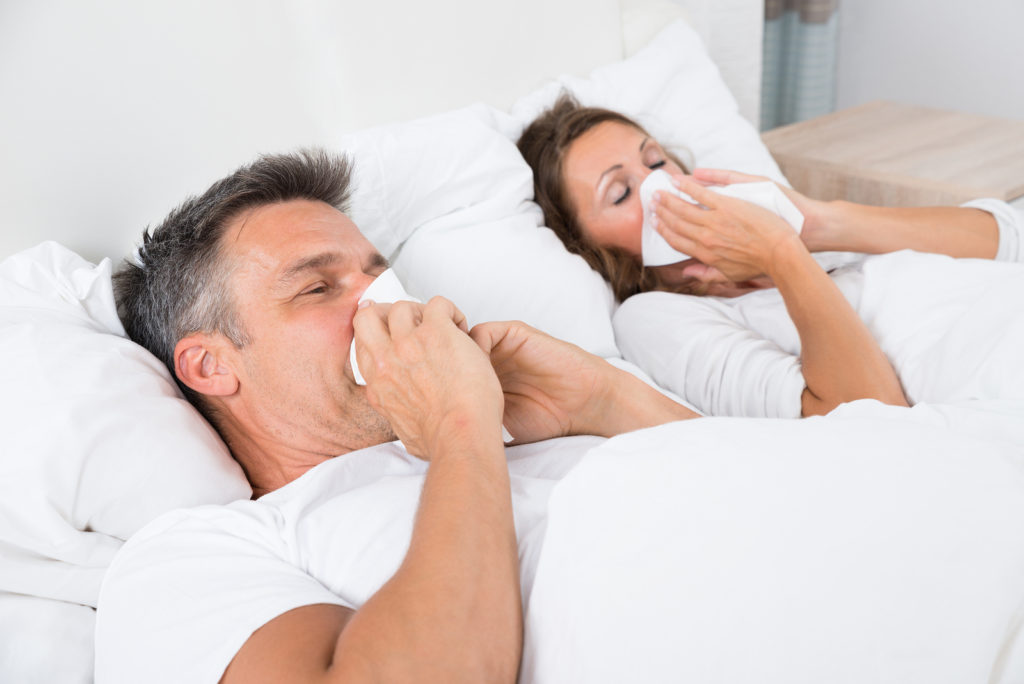Take Back the Night: 4 Ways Allergies Can Destroy Your Sleep, and What You Can Do About It
Allergies, seasonal or otherwise, have the power to plague your waking life with sinus pressure, sneezing, and burning, itching eyes. However, you may not realize that allergies can also keep working at night to destroy the quality of your sleep, and leave you unrefreshed and drowsy the next day.
Here are 4 common ways allergies can impact the quality of your sleep, and some tips for making the most of your nights, and reclaiming your rest from pesky allergies:
- Allergies lead to poor quality of sleep, and daytime drowsiness.
Even while you are sleeping, allergies can attack and lead to a poor night of sleep. According to the National Sleep Foundation, allergic rhinitis can occur during both your waking and sleeping cycles. Allergic rhinitis occurs when you breathe allergens into your body through your nasal passages. If you are even mildly allergic to these allergens, it can cause your body to react with chemical releases designed to rid your body of the allergens, leading to congestion, runny nose, and irritated eyes.
These allergic reactions can keep you awake at night, and can also contribute to restless sleep patterns that will leave you feeling unrested and tired the next day.
- Indoor and outdoor allergens can impact your sleep.
Allergens are most commonly associated with the outdoors in the form of dust, pollen, and grass. However, there are many allergens that can be lurking indoors and impacting your sleep.
According to the American College of Allergy, Asthma, and Immunology, common indoor allergens include:
- Mold spores
- Dust
- Dust mites and their waste products
- Animal hair, dander, or urine
- Cockroach particles and waste
- Allergies can occur all year round, and negatively impact your sleep quality.
Many people experience seasonal allergies due to blooming plants, grasses, and flowers in the Spring and Summer months. These allergies are the result of increased pollen in the air, and while it may be beautiful outdoors, these allergens can easily steal hours from your much needed night of rest.
However, allergies have the potential to impact your sleep all year round due to dust, mold, or pet dander that may exist in your home.
- Allergies are strongly linked with sleep disorders.
Allergies are strongly linked with snoring and sleep apnea, according to studies cited by the National Sleep Foundation. Sleep apnea can be a very serious condition, as it causes you to stop breathing for periods of time while you sleep. While inflammation in the nasal passage and airways from allergies can aggravate or worsen existing sleep disorders, reducing this inflammation through allergy treatment and medication has been shown to have a positive impact on sleep as well.
Tips for Combatting Your Allergies, and Getting More Restful Sleep
Allergies can cause you to lose valuable rest, but the Huffington Post suggests these things you can do to keep your allergies subdued, and get the most from your night of sleep.
- Keep your home clean and regularly change linens to keep them fresh, and free of dust, pet hair, and dander.
- Keep the windows closed.
- Maintain a cooler temperature in your bedroom, and keep it dark and quiet.
- Avoid drinking alcohol or anything containing caffeine before bed.
- Take a warm, steamy shower before bed to loosen congestion.
- Use allergy medications or saline nasal spray to help control allergy symptoms, and get more rest.
If you struggle to get the rest you need for several nights a week, over the course of a few months, then your sleep issues may not be entirely related to allergies. You should consult a sleep specialist, and participate in a sleep study if you find yourself tired often, or have frequent sleep problems.


